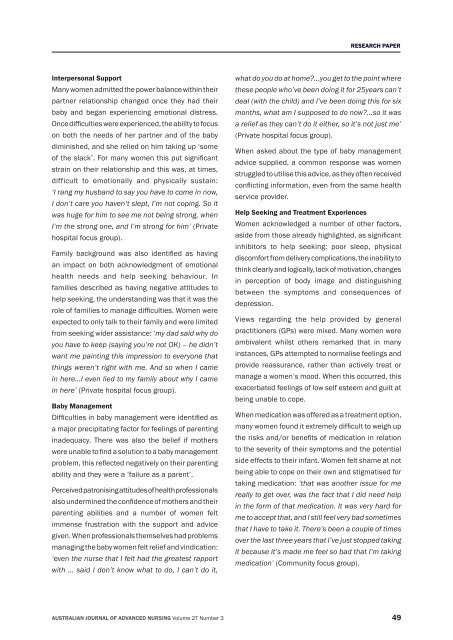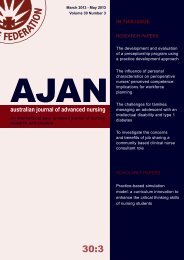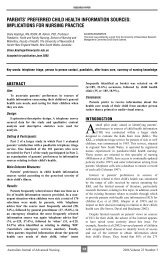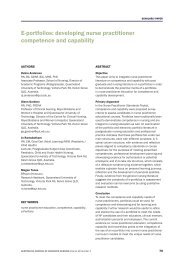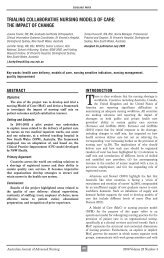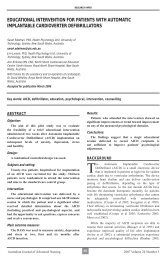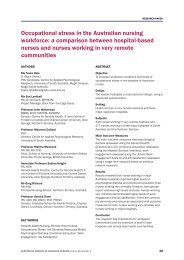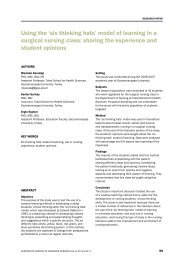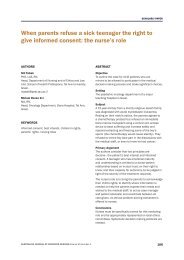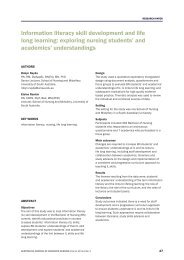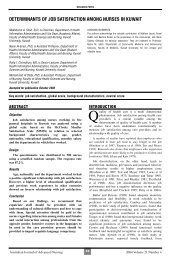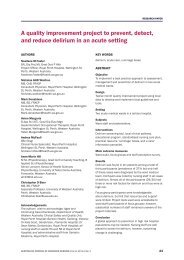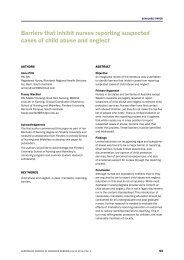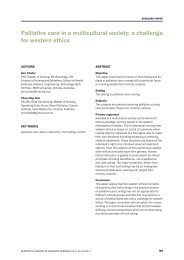March-May, 2010 - Australian Journal of Advanced Nursing
March-May, 2010 - Australian Journal of Advanced Nursing
March-May, 2010 - Australian Journal of Advanced Nursing
Create successful ePaper yourself
Turn your PDF publications into a flip-book with our unique Google optimized e-Paper software.
RESEARCH PAPER<br />
Interpersonal Support<br />
Many women admitted the power balance within their<br />
partner relationship changed once they had their<br />
baby and began experiencing emotional distress.<br />
Once difficulties were experienced, the ability to focus<br />
on both the needs <strong>of</strong> her partner and <strong>of</strong> the baby<br />
diminished, and she relied on him taking up ‘some<br />
<strong>of</strong> the slack’. For many women this put significant<br />
strain on their relationship and this was, at times,<br />
difficult to emotionally and physically sustain:<br />
‘I rang my husband to say you have to come in now,<br />
I don’t care you haven’t slept, I’m not coping. So it<br />
was huge for him to see me not being strong, when<br />
I’m the strong one, and I’m strong for him’ (Private<br />
hospital focus group).<br />
Family background was also identified as having<br />
an impact on both acknowledgment <strong>of</strong> emotional<br />
health needs and help seeking behaviour. In<br />
families described as having negative attitudes to<br />
help seeking, the understanding was that it was the<br />
role <strong>of</strong> families to manage difficulties. Women were<br />
expected to only talk to their family and were limited<br />
from seeking wider assistance: ‘my dad said why do<br />
you have to keep (saying you’re not OK) – he didn’t<br />
want me painting this impression to everyone that<br />
things weren’t right with me. And so when I came<br />
in here…I even lied to my family about why I came<br />
in here’ (Private hospital focus group).<br />
Baby Management<br />
Difficulties in baby management were identified as<br />
a major precipitating factor for feelings <strong>of</strong> parenting<br />
inadequacy. There was also the belief if mothers<br />
were unable to find a solution to a baby management<br />
problem, this reflected negatively on their parenting<br />
ability and they were a ‘failure as a parent’.<br />
Perceived patronising attitudes <strong>of</strong> health pr<strong>of</strong>essionals<br />
also undermined the confidence <strong>of</strong> mothers and their<br />
parenting abilities and a number <strong>of</strong> women felt<br />
immense frustration with the support and advice<br />
given. When pr<strong>of</strong>essionals themselves had problems<br />
managing the baby women felt relief and vindication:<br />
‘even the nurse that I felt had the greatest rapport<br />
with … said I don’t know what to do, I can’t do it,<br />
what do you do at home?...you get to the point where<br />
these people who’ve been doing it for 25years can’t<br />
deal (with the child) and I’ve been doing this for six<br />
months, what am I supposed to do now?...so it was<br />
a relief as they can’t do it either, so it’s not just me’<br />
(Private hospital focus group).<br />
When asked about the type <strong>of</strong> baby management<br />
advice supplied, a common response was women<br />
struggled to utilise this advice, as they <strong>of</strong>ten received<br />
conflicting information, even from the same health<br />
service provider.<br />
Help Seeking and Treatment Experiences<br />
Women acknowledged a number <strong>of</strong> other factors,<br />
aside from those already highlighted, as significant<br />
inhibitors to help seeking: poor sleep, physical<br />
discomfort from delivery complications, the inability to<br />
think clearly and logically, lack <strong>of</strong> motivation, changes<br />
in perception <strong>of</strong> body image and distinguishing<br />
between the symptoms and consequences <strong>of</strong><br />
depression.<br />
Views regarding the help provided by general<br />
practitioners (GPs) were mixed. Many women were<br />
ambivalent whilst others remarked that in many<br />
instances, GPs attempted to normalise feelings and<br />
provide reassurance, rather than actively treat or<br />
manage a women’s mood. When this occurred, this<br />
exacerbated feelings <strong>of</strong> low self esteem and guilt at<br />
being unable to cope.<br />
When medication was <strong>of</strong>fered as a treatment option,<br />
many women found it extremely difficult to weigh up<br />
the risks and/or benefits <strong>of</strong> medication in relation<br />
to the severity <strong>of</strong> their symptoms and the potential<br />
side effects to their infant. Women felt shame at not<br />
being able to cope on their own and stigmatised for<br />
taking medication: ‘that was another issue for me<br />
really to get over, was the fact that I did need help<br />
in the form <strong>of</strong> that medication. It was very hard for<br />
me to accept that, and I still feel very bad sometimes<br />
that I have to take it. There’s been a couple <strong>of</strong> times<br />
over the last three years that I’ve just stopped taking<br />
it because it’s made me feel so bad that I’m taking<br />
medication’ (Community focus group).<br />
AUSTRALIAN JOURNAL OF ADVANCED NURSING Volume 27 Number 3 49


